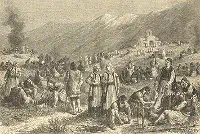Thebes: Ancient Greek Power and Mythmaker
Thebes was one of the most powerful of the cities of Ancient Greece and was also the setting for many of that civilization's memorable myths. The city was the largest in the region of Boeotia, in east-central Greece, to the north of both Athens and Corinth. Thebes was the most influential member of the Boeotian League, an alliance of cities in the region that developed in the 6th Century B.C. 
Beginning in the 5th century, Thebes chose its own way in conflicts in Greek lands. In the middle of the Greco-Persian Wars, after the Persian victory at Thermopylae, Thebes and most of the Boeotian League threw in their lot with the invading Persians, who were led by Xerxes the Great. After the Greek victory, the other Greek city-states dissolved the Boeotian League and kept Thebes from reasserting dominance. Thebes bided its time and revolted in 446, allying with Sparta against Athens in the struggle that developed into the Peloponnesian War. The victory over Athens in 404 B.C. left Sparta as the major power but also left Sparta rather weakened. Thebes seized the opportunity in the Corinthian War a decade later, but Sparta, with Persian help, won that struggle as well. Thebes, led by two successful commanders named Epaminondas and Pelopidas, turned to a rebuilding Athens as an ally in 379, and the alliance was enough to defeat Sparta in two subsequent battles, at Tegyra in 375 (under Pelopidas) and at Leuctra (under both generals) in 371. That last victory established Thebes, as the dominant power in the Greek world, and this pre-eminence lasted for a decade. Pelopidas was killed in battle in 364. Epaminondas took the struggle to the heart of Sparta itself, the Peloponnese, and he was killed at the Battle of Mantineia in 362. The loss on the battlefield and of the general sparked a rapid decline, and Thebes was at the mercy of the invading Macedonian army, led by Philip II. After the Macedonian victory at the Battle of Chaeronea in 338, Philip established a strong military presence in Thebes. Just two years later, Thebes tried to push out the Macedonians, then led by Philip's son, Alexander the Great; Alexander was so incensed that after his victory was achieved, he ordered Thebes destroyed. A successor of Alexander, Cassander, ordered the city rebuilt in 316, and it embarked on a period of renewal, as did the Boeotian League, once again. Thebes took part in the Achaean revolt and then came under the hammer of Rome, in particular the general Sulla. Thebes was also the home of the poet Pindar, one of Ancient Greece's most well-known writers. It was said that when Alexander ordered Thebes destroyed, nearly a century after Pindar's death, he stipulated that the house that Pindar had lived in should be spared. |
|
Social Studies for Kids
copyright 2002–2024
David White




